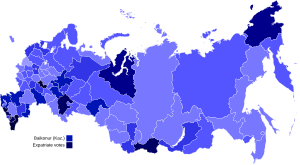| |||||||||||||||||||||
| Opinion polls | |||||||||||||||||||||
| Registered | 107,222,016 | ||||||||||||||||||||
|---|---|---|---|---|---|---|---|---|---|---|---|---|---|---|---|---|---|---|---|---|---|
| Turnout | 69.71% ( | ||||||||||||||||||||
| |||||||||||||||||||||
 Results by federal subject Dmitry Medvedev: 55–60% 60–65% 65–70% 70–75% 75–80% 80–85% 85–90% 90–95% | |||||||||||||||||||||
| |||||||||||||||||||||

Presidential elections were held in Russia on 2 March 2008 and resulted in the election of Dmitry Medvedev as the third President of Russia. Medvedev was elected for a four-year term with the support of incumbent president Vladimir Putin and five political parties (United Russia, Fair Russia, Agrarian Party, Civilian Power, and Russian Ecological Party "The Greens"), received 71% of the vote, and defeated Gennady Zyuganov of the Communist Party of the Russian Federation, and Vladimir Zhirinovsky of the Liberal Democratic Party of Russia.[1][2]
The fairness of the election was disputed, with official monitoring groups giving conflicting reports. Some reported that the election was free and fair, while others reported that not all candidates had equal media coverage and that the opposition to the Kremlin was treated unfairly. Monitoring groups found a number of other irregularities.[3] The European election monitoring group PACE characterized the election as "neither free nor fair."[4]
The Organization for Security and Co-operation in Europe (OSCE) election monitoring group refused to monitor the election because of what it called "severe restrictions on its observers by the Russian government", a charge Russia vehemently rejected, calling the decision "unacceptable".[5]
- ^ Reintroducing: The Democratic Party Of Russia Archived 2018-11-18 at the Wayback Machine, The eXile, June 15, 2007.
- ^ Presidential candidate Bogdanov denies Kremlin ties, Reuters, January 30, 2008.
- ^ Cite error: The named reference
goloswas invoked but never defined (see the help page). - ^ Hooper, Adrian Blomfield in Moscow and Duncan. "Russian election". Telegraph.co.uk. Retrieved 2016-04-19.
- ^ Cite error: The named reference
nwas invoked but never defined (see the help page).


